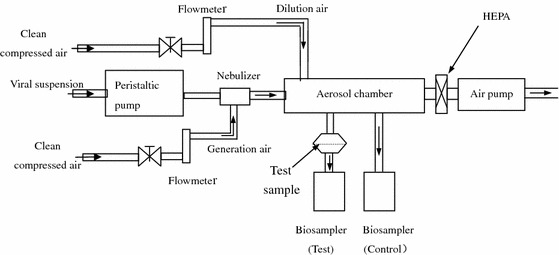Hospital-based outbreaks of extreme acute respiratory syndrome (SARS) have as soon as once more highlighted the vulnerability of healthcare employees (HCWs). Use of private respiratory protecting tools was the important methodology utilized by HCWs to keep away from nosocomial transmission.
This paper describes the expertise used to guage the filtration efficiency of the half-face medical protection mask (N99), manufactured by Firmshield Biotechnology, against viral aerosol. Viral aerosol was generated after which sampled concurrently with and with out the take a look at mask.
This permits a share efficiency worth to be calculated against take a look at phage f2 aerosols (surrogates of viral pathogen aerosols). At the similar time the mask filtration efficiency against NaCl particle aerosol was decided by use of TSI8130 tools and face-fit issue was examined by use of TSI8020 tools.
The half-face medical protection mask (N99) evaluated by use of the viral aerosol had a filtration efficiency >99%. The mask filtration efficiency against NaCl particle aerosol was 99.634 ± 0.024% and it had face-fit issue.
This half-face medical protection mask (N99) can defend the wearer from viral aerosol illness transmission. The take a look at methodology can be utilized to evaluate filtration efficacy against viral aerosol of masks used for respiratory protection.

Recent developments in the use of transgenic crops for the manufacturing of human therapeutics and biopharmaceuticals.
In current years there was a dramatic enhance in the software of plant biotechnology for the manufacturing of a range of commercially precious easy and complicated organic molecules (biologics) to be used in human and animal healthcare.
Transgenic entire crops and plant cell tradition techniques have been developed which have the capability to economically produce large-scale portions of antibodies and antibody fragments, antigens and/or vaccine epitopes, metabolic enzymes, hormones, (neuro)peptides and a range of biologically energetic complexes and secondary metabolites for direct use as therapeutic brokers or diagnostic instruments in the medical healthcare business.
As the merchandise of genetically modified crops make their means from idea to commercialization the related dangers and acceptance by the public has been turn out to be a focus. In this paper, we summarize the current advances made in the use of transgenic crops and plant cell cultures as organic factories for the manufacturing of human therapeutics and biopharmaceuticals and talk about the long-term potential of `molecular farming‘ as a low-cost, environment friendly methodology for the manufacturing of organic supplies with demonstrated utility to the pharmaceutical business or medical group.
